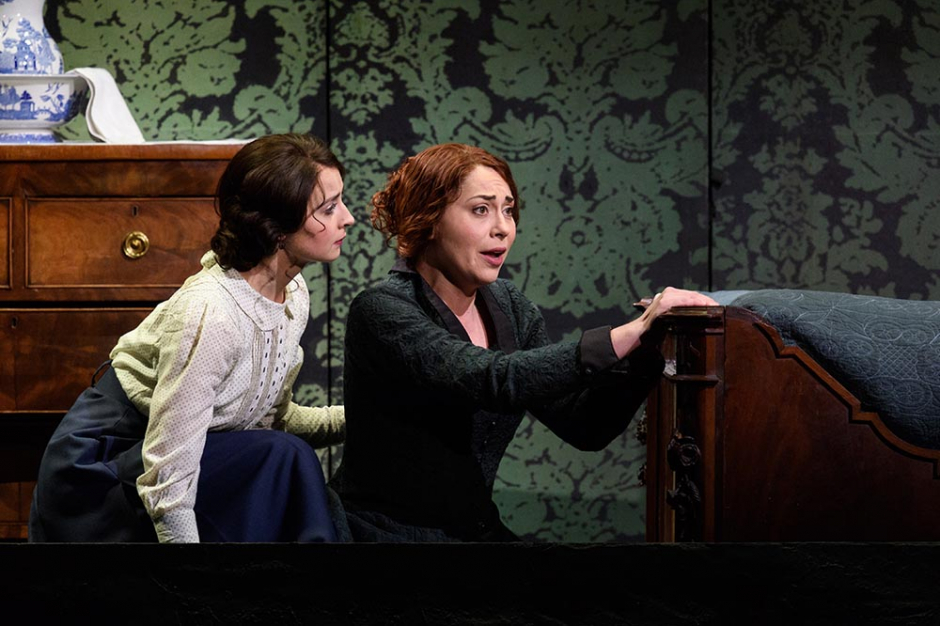Opera North’s Katya Kabanova | The Lowry: Thursday March 7th
Thursday night’s performance of Katya Kabanova by Opera North at the Lowry was set in a bleak, grey-green world. Director Tim Albery’s decision to play all three acts together with no interval was an excellent one that allowed the intensity of Katya and the cruelty of her mother-in-law Kabanicha to build and fester. For a story that is described as an epic romance – the score is both epic and romantic – I love Leoš Janáček’s brave percussion and sweeping heart and Sian Edwards as conductor was magical. This was remarkably an Opera about women rather than love: they were good, bad crazy and escaping while on the whole the men were absent, weak and wanting. Boris just leaves Katya when told to, neither seem to agonise much over the end of their little affair so much as over the lives that are largely just as grim and curtailed as they were before it started.
Heather Shipp’s version of Kabanicha was grim and authoritative: the excited ripple from the audience at a tense scene of dominance (and… erotic face slapping?) when the cruel Dikoy confesses to having beaten up a peasant was among my favourite moments. Stephanie Corley’s Katya was heart-breaking and shifting, the crazed frenzy she descends into by the end of the play requiring rapid and confident shifts in tone and register. Overall the staging had the feeling of a sad Russian epic, or perhaps a slice of one. This is an unsurprising interpretation since Leoš Janáček was an avid fan of Russian literature and folklore and that this libretto was based on an Ostrovksy play, The Storm, but it felt a little confused about when it was set. References to the Bolsheviks were more in keeping with the WW1 period it was written in than the early Victorian interior or Tsarist Russian peasant dynamics.
The two lovers, Katya and Boris are both trapped in abusive domestic spaces but part of the story (and apparently a part of it that originally made Janáček less popular with the Prague Opera going crowd when it was first written) are the repeated iterations of how Katya’s position as a married women is more hopeless, more confined than that of a single man. A sparsely decorated, largely empty set with traditional curtains lowered after each scene so that the walls could be changed mostly provided a great feeling of emotional poverty that allowed ample room for the music to speak and swell. These two are drawn to each other, not because of anything to do with their personalities but because of the incredible emptiness and lack of warmth in their lives. I haven’t been to a piece of theatre for a very long time that simply lowered the curtain on us and left us with the music while people shuffled about ‘backstage’. I suppose that in some way it fit the overall feeling of bleak emptiness. The on stage performers of Katya Kabanova seemed to be a kind of bare scaffolding on which the music was hung rather than a fleshing out of the music.
Varavra was sung by Katie Bray in a truly excellent portrayal of a charismatically flippant young creature who happily tempts the unstable Katya into indiscretion and then runs off with her lover. She stood out more sharply against the interiors in blue and white and, since she more willingly and easily escaped the confines of their oppressive domestic scene, was perhaps meant to be more obviously out of place. Katya was portrayed as an intense and spiritual creature who seemed to want to walk the impossible tightrope she was expected to navigate: to not hug her husband on his leaving but cry herself sick on the doorstep once he’s left; to not ask for his attention but not even look at another man when he’s gone. When she fails she cannot cope with her own guilt and starts going mad. She hears music and is driven eventually to suicide in the Volga River that we heard admired in the opening scene and which winds through the story.
The empty sets and single pallet colour scheme did allow for some perfectly timed and excellently deployed shadows and light work. Katya’s two big moments of breaking were both sung with a sharp giant shadow looming over her. This was a dramatic staging of Katya Kabanova, the music beautiful, and the desperate bleakness of the play beautifully captured.
by Tessa Harris

